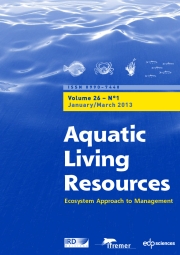Article contents
Fishing strategies, economic performance and management of moored fishing aggregating devices in Guadeloupe
Published online by Cambridge University Press: 05 April 2013
Abstract
Moored FADs (MFADs) have been a key area for development in Guadeloupe (Lesser Antilles) since the late 1980’s. The main objectives underpinning the development of MFADs were to (i) reduce fishing pressure on coastal fishing resources; (ii) boost fishermen’s incomes; and (iii) increase local consumption of locally generated fishery products as a proportion of overall consumption. This paper gives an overview of the current structure of Guadeloupe’s fishing fleet and fisheries, with a specific focus on MFAD fleets in a relatively unstructured environment with regard to regulation, and so how these fleets operate in a context of unrestricted development of private MFADs. In addressing the following key issues, this paper aims to: assess the economic performance of fleets operating on MFADs, understand why the MFAD fishing activity has not developed more than it has, and suggest how better MFAD management could improve the situation. Socio-economic information on a trip and fleet level basis were collected and stored on a fisheries information system to analyse the relative attractiveness of MFAD fishing and assess the overall economic performance of MFAD fleets as compared to other non-MFAD fleets. Non-monetary variables were also tested to explain the degree of dependence on MFADs. In 2008, economic returns from FADs were relatively low, both in terms of wages for the crews and in terms of profit for vessel owners. Earnings were higher than coastal fishing activities, but seem to have been very sensitive to the indicators used in our analysis. MFADs are expected to become much more attractive as a result of MFAD regulation, especially through the establishment of collective MFADs.
Keywords
- Type
- Research Article
- Information
- Copyright
- © EDP Sciences, IFREMER, IRD 2013
References
- 10
- Cited by


